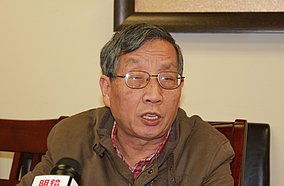Hu Ping
... was born in 1947 in Beijing, but was soon brought to Sichuan by his mother and attended school there. In 1966 he joined the Red Guards, before he was sent to the countryside to work in a "construction brigade" like many young people at the time. After his return to Chengdu in 1973 he worked in various temporary jobs, in 1978 though, he passed the entry exam to become a graduate student at Peking University's Philosophy Department. From 1979 on Hu became active in the Democracy Wall Movement. In the journal "Fertile Soil" ("Wotu") he published a long article "On the Freedom of Speech" which received wide attention.
In November 1980 Hu Ping decided to run for a seat in the Haidian District People's Congress, and he participated in the heated electoral debates among the almost thirty candidates in this pluralistic campaign. With a platform close to the demands of the Democracy Wall Movement, he succeded to obtain a majority of the votes in this students' constituency, to be elected "people's deputee".
But Hu Ping soon found out that he had little to discuss and even less to decide in this new function, and because of his critical approach to the official political line, he was not attributed a job for two years after his graduation. Eventually he got a post at the Beijing Publishing House in 1983, and two years later he managed to join the Academy of Social Sciences, a main reformist think tank at the time. In 1987 he left China for a post-graduate course at Harvard University in the US.
Hu soon became engaged in the Chinese democracy movement in exile, he edited the journals "China Spring" and "Beijing Spring", and in 2015 he was named "honorary editor-in-chief" of "Beijing Spring". Hu Ping now lives in New York.
Interview with Hu Ping (May 27, 2014 at the Asiatic Hotel in Flushing, New York)
Here you find the Chinese text of the interview (an English translation will be provided later).







